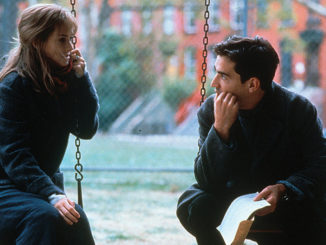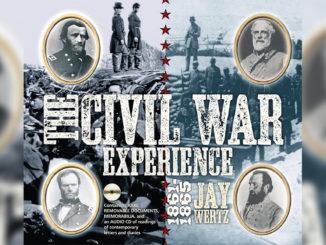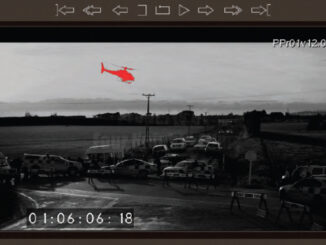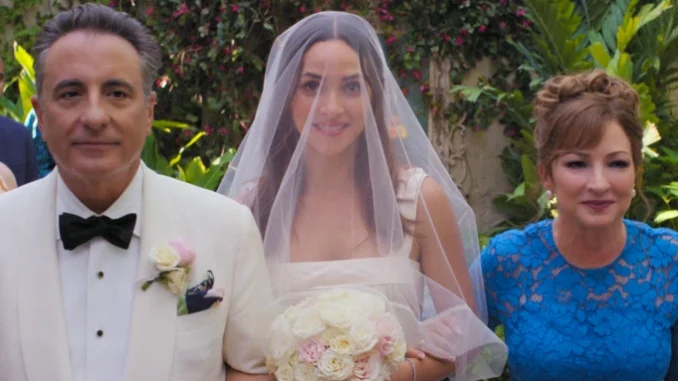
By Peter Tonguette
Times change, cultural attitudes shift, and ideas about marriage evolve, but through it all, “Father of the Bride” has remained a sure bet with audiences. The film series originated in the 1950s, with Spencer Tracy starring as a wedding-weary father in a pair of beloved romantic comedies, continued in the 1990s with Steve Martin in the same role in two films, and now has been reimagined once more.
This summer, the latest — and boldest — iteration of “Father of the Bride” premiered on HBO Max, on June 16. The Warner Bros. release stars Andy Garcia as Billy Herrera, the paterfamilias of a large Cuban-American family in Miami. As the film opens, Billy is confronted with two dramatic changes in his domestic life: He and his wife Ingrid (Gloria Estefan) plan to divorce, and their eldest daughter Sofia (Adria Arjona) has announced her imminent marriage to Adan (Diego Boneta), a young man from a Mexican-American family.
To help bring the story into a new time, setting, and cultural milieu, Mexican filmmaker Gary “Gaz” Alazraki tapped veteran picture editor Jon Poll, whose extensive experience includes cutting several much-loved comedies, among them “Meet the Parents” (2000) and “Meet the Fockers” (2004). For “Father of the Bride,” Poll, also an accomplished editor of dramatic films including “Bombshell” (2019) and the forthcoming musical version of “The Color Purple,” sought a balance between laughs and sentiment, jokes and family drama.
CineMontage recently spoke with Poll about the difference between cutting comedy and drama, his collaboration with Alazraki, and the many ways in which the new “Father of the Bride” isn’t your father’s “Father of the Bride.”
CineMontage: What appealed to you about working on “Father of the Bride”?
Jon Poll: I did the movie because I thought it was a very different way of looking at the story, and that it was a drama and a comedy: a dramedy. Gaz made a wonderful movie called “Nosotros los Nobles,” and it was about family. It was funny and dramatic and heartwarming, like a Billy Wilder film. I thought he would make a really interesting movie out of this, which he did.
When I read the script, I immediately saw something that you usually don’t see. I can’t remember a film where there were people from different Latin cultures in the same movie. It’s a big part of the movie. Many people shared that it meant a lot for them to see themselves in a movie.
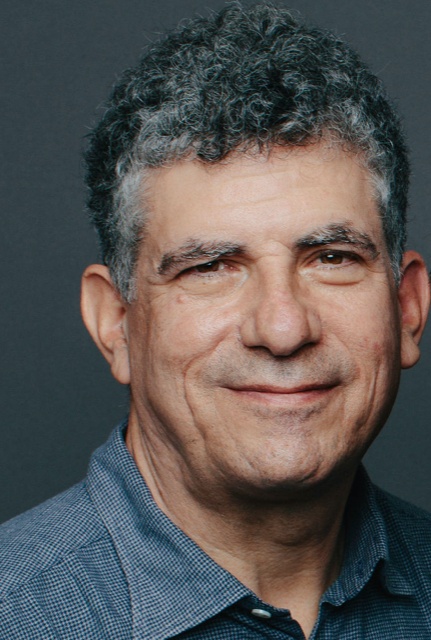
CineMontage: You’ve done a lot of comedies in your career. Has that been a conscious choice?
Poll: Yes, I’ve always loved comedies. There is no question that, whether you want to or not, Hollywood wants to pigeonhole you. In the last couple of years, I’ve been able to switch that around a little bit. I love so many different kinds of movies. The only movies I don’t love are movies that take themselves so seriously that they have no humor in them. I think that comedy is something that exists in life, and my favorite movies are ones that have humor in them.
CineMontage: Is comedy more challenging to cut than drama?
Poll: This is a huge generalization, and I don’t mean to take anything away from myself or anyone who cuts drama, but there are many different ways that you can end up cutting a dramatic scene and make it work. In a comedy, you have to find the best timing for a joke to land. You end up trying many different versions in order to get the best reaction. There’s also something about the subtraction of things in comedy to keep people laughing, and if you have a joke that doesn’t work and you take it out, you find that all of a sudden you are surfing the laughs better.
CineMontage: There’s something to be said for comedies like “Father of the Bride,” which deal with real-life situations or things that many people have gone through.
Poll: I completely agree. In the big dinner scene, Billy [Garcia] is flabbergasted that his daughter actually proposed to Adan [Boneta], her fiancé. He just keeps repeating the same thing over and over: “Did you do that? Can you do that? Do people do that?” That line was in the script, but Andy just riffed off it so naturally. We got three or four solid laughs out of it, because it was grounded and real, and people could relate to it. Mostly you could relate to his character being shocked by this, even though it might not have shocked you.
CineMontage: How did you and Gaz Alazraki collaborate?
Poll: Working with Gaz was a pleasure. Gaz’s take was: “We have to get Billy right first. I’m not worried about the other characters right away. If I feel like I’m tracking Billy in every moment of the movie, we’re going to be there, and we can enrich it from there.” He was really right. We made sure Billy was where he wanted him to be.
Andy does such a great job of giving us choices. There’s a version of the movie where Billy was even sadder. But we went for the version where he was more awkward and often the butt of the joke. We had all of these options, and Gaz would tell me what he wanted in a scene. He knew what he wanted, but he wouldn’t be prescriptive and say, “Do this or do that.” He would let me try and find whatever emotional reaction or comedic reaction or stylistic feeling that he was looking for. It was a really efficient way of working.
CineMontage: As you were cutting the film, what did you think it was — a comedy or a drama?
Poll: As we were making it, I honestly felt that it was more of a drama than a comedy. When we got it up on its feet in front of audiences, we asked this question in screenings. Interestingly, the audience was evenly divided, and they agreed that it was equally a comedy and a drama. That, to me, mirrors life. Those are the most interesting movies to me.
This is what is really satisfying about the film: Your guard is let down by the humor, and you don’t expect that you’re going to have as emotional an experience in the end as you do. There’s a scene at the beginning of the movie where Adan says to Billy, “I really love your daughter. I want to be like your daughter.” And Billy scoffs at Adan. He goes upstairs to Ingrid [Estefan], as they’re getting into bed, and puts on a funny voice and calls Adan a vegetarian. Then, at the end of the movie, Billy has grown up. It’s a coming-of-age story for him. He realizes that he has taken his family for granted. He’s making a speech at the end, and when he toasts his son-in-law he says, “You said you wanted to be like my daughter . . . and now I want to be more like you.” I found that really, really charming and moving.
CineMontage: Reaction shots are important in this film.
Poll: Sometimes a scene can play in a master, but in comedies, you often need to cut more to create the exact timing that gets the laugh. In a drama, reactions are great ways to tell stories — you often learn more by how a character reacts to a line — but in a comedy, you also get laughs on the reactions rather than just the line.
The younger sister, Cora [Isabela Merced], has such great disses of Billy with her looks. There’s a wonderful moment when we’re in the kitchen, and she doesn’t even have a line. She just picks up a bowl of popcorn and starts eating it. The wedding planner is there, and they’re all arguing, and she’s just watching it — like it’s a movie. In many films, secondary characters end up getting cut out more. That’s just a part of the process, but in a movie like “Father of the Bride,” you have seven characters who are part of this family. Some of them don’t even have a lot of lines. During the dinner scene, it’s about making sure that you know what everyone is thinking about everything that is going on at that table the whole time, and always checking in with each person to keep it alive. And if you get extra laughs out of it, all the better.
CineMontage: The film runs almost two hours. Was it important to have that length to fully develop both the comedy and the drama?
Poll: No matter what you do, preview audiences will often say, “It sure takes a long time to get going.” Well, yes, that’s called the setup. “And it sure takes a long time to wrap everything up.” Yes, because you’re tying up all the loose ends. When we had our first preview, the ending of the movie was quite long. There’s a great, energetic one-r that’s about four minutes long of getting the wedding ready, but then you’re in a lot of scenes. But I think we underestimated the audience, and they wanted more resolution. We made the ending of the movie longer by including scenes and beats we’d removed for time. We gave a little more weight to tying up all of the stories and relationships — and it worked. There was a deeper feeling of emotional satisfaction for the audience:
CineMontage: Talk about your team on the movie.
Poll: Kheireddine El-Helou was my excellent first assistant and talented additional editor. Kelly McGillicuddy was our phenomenal assistant who contributed in so many ways. Jacob Ehrlich was our PA, who loved involving himself in the entire process. Leslie Rodier was our post supervisor who kept us on track and loved the film. Sebastian Zuleta was our music editor who helped us immensely. Travis Dultz was our eagle-eyed VFX editor. Onnalee Blank, Odin Benitez, Harrison Meyle, Mike Babcock, and Matt Waters made the sound mix come alive.
CineMontage: I understand that you have come to relate to the film in a very personal way.
Poll: The biggest irony, to me, is that my daughter is getting married next month in Italy to her longtime boyfriend. They live in France, they’re getting married in Italy, where his family is from, and a lot of these dramas are very similar. They’re very relatable. She texted, “I’m looking forward to watching a movie that has other people’s wedding issues.”



